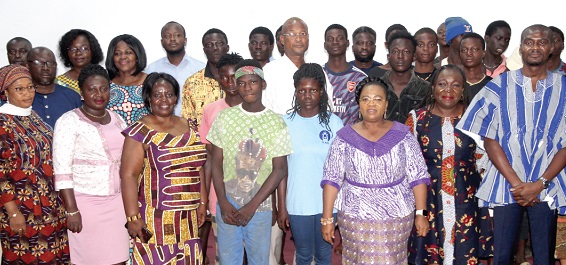
Commemoration of Street Children’s Day: 75% Street children foreigners - Social Welfare
About 75 per cent of children living on streets in the country are foreigners, the Department of Social Welfare (DSW) has said.
Quoting a recent research conducted by the National Security, the Director of the DSW, Rev. Dr Comfort Asare, said majority of those children were from Mali, Niger and other neighbouring countries, and that they were escaping from hunger and crisis situations that had arisen because of war and instability in their countries, while others were also brought into the country by their families.
Advertisement
According to her, discussions were ongoing at the ministerial level to address the issue.
Rev. Dr Asare was speaking at this year's commemoration of the International Day for Street Children in Accra On Tuesday, April 13, 2022.
She said a census conducted in 2014 by the DSW revealed that in the Greater Accra Region alone, 61,492 children were growing up on the streets, consisting of 66 per cent migrant children and 18 per cent urban dwellers.
Event
April 12, each year is commemorated globally as Street Children Day.
The global theme for this year's commemoration was: "Safe places", while the local theme was: "The role of everyday Ghanaian in addressing the issues of children in street situations".
The event was attended by officials from both the DSW and the Ministry of Gender, Children and Social Protection (MoGCSP), street children and non-profit organisations.
Explaining why there were so many children on the streets now, Rev. Dr Asare said some of them left home voluntarily because of abuse by their families, while some were on the streets because they had been rejected by their families.
For others, she said, it was as a result of disabilities, parental neglect, false perception about city life, peer pressure and escape from forced marriages.
The director said even though the MoGCSP was doing its best, some of the children were not prepared to leave the streets, adding that there was a time the ministry rescued about 200 children from the streets, but at the end of the day, only about 40 of them stayed to receive vocational training.
During a panel discussion, some former street children shared their harrowing experiences on the streets.
One of them, Nelson Dinsah Jedi, who now works with an NGO, said the rainy season was the most difficult time for him when he was on the streets.
He explained that anytime it rained, he had to stand for hours for the rains to subside before he could sleep.
Preventive measures
Rev. Dr Asare said the DSW was training and encouraging foster parents to adopt some of the rescued street children.
So far, she added, it had been able to train some 1,007 foster parents, with 207 rescued children given to them.
“According to the Convention on the Rights of the Child, children should live in stable, loving and nurturing environments, with proper health care and nutrition and provided equal opportunities to live in dignity and freedom. Sadly, children on the streets don’t have these rights,” the director said.
The Country Representative of the Catholic Relief Services (CRS), Daniel Mumuni, said the issue of streetism was a reflection of how society and the global community had failed, explaining that it was inexcusable that societal dysfunction or failure had compelled young men and women who were capable of contributing to development to live on the streets.
He said the commemoration of the day provided the opportunity for duty bearers to reflect on the failures of the state and proffer a way out of the worsening situation.
The Deputy Director, Standards, Research, Monitoring and Evaluation of the DSW, Georgina Mensah, said the Children’s Act of 1998 (Act 560) gave responsibility to district assemblies and adults to protect children.
According to her, a recent report from the International Labour Organisation (ILO) and UNICEF indicated that globally, over 150 million children lived on the streets, while, in Africa, the figure was about 30 million.



